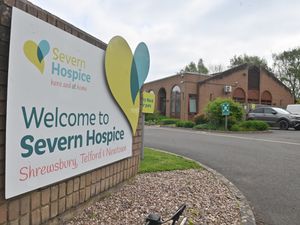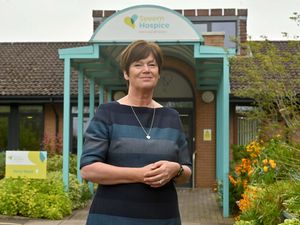Inspectors downgrade Shrewsbury mental health units to inadequate
Mental health wards in Shrewsbury operated by an NHS trust have been rated 'inadequate' by inspectors, who uncovered a catalogue of failings.

The Care Quality Commission (CQC) has downgraded the wards, operated by the Midlands Partnership University NHS Foundation Trust, which include three at the Redwoods Mental Health Centre in Shrewsbury.
Responding to the report, the trust said "a significant amount of positive change" had taken place at the units in the time since the inspection, after action plans were drawn up.
The CQC report says an unannounced inspection took place after it was told of "serious incidents", including three where patients had taken their own lives during a period of leave from their ward, and four "fire setting incidents" at The Redwoods Centre.
The inspection was focused on the "acute wards for adults of working age and psychiatric intensive care units" at the Redwoods, and St George’s Hospital in Stafford.
The inspection team raised concerns over 'ligature risk assessments' and the identification of 'potential ligature anchor points', which can be used by people to strangle themselves – saying they were not completed thoroughly enough to reduce the risks to patients.
Fire safety assessments at the Redwoods Centre were also found to be "insufficient".
Inspectors also raised concerns over assessments of the mental state of patients who were allowed to take leave from the units.
The report states: "Care and treatment records did not always demonstrate how staff assessed a patient’s mental state and risk presentation at the point of taking leave.
"This included recording the decision made about leave following any assessment. On Birch ward (at Redwoods), none of the records demonstrated staff assessed patients and recorded a decision about leave at the point of the patient taking leave. On Brocton ward (at St George's), four records failed to demonstrate the same."
Other concerns raised included staff at the trust saying they were worried that agency workers brought in to cover vacancies were not familiar with local policies or procedures to keep patients safe.
The trust was given a number of immediate actions for improvement, after both the 'Is the service safe?' and 'Is the service well led?' categories were downgraded to inadequate.
Andy Brand, the CQC’s deputy director of operations in the Midlands, said improvements had been made, but the trust will continue to be monitored.
He said: “When we inspected this service, improvements were needed to ensure people were receiving appropriate care in a safe environment, and staff were fully being supported to carry out their roles properly.
“Managers needed to do more to mitigate the impact of staff shortages as understaffing was negatively affecting the quality of care being provided, with many staff reporting they felt unable to meet the needs of people due to these challenges.
“We also found environmental issues that needed addressing. For example, ligature risk assessments to identify any risk areas hadn’t been completed effectively meaning people could be placed at risk of harm. The trust responded to these issues following the inspection and submitted an action plan detailing how they’d make improvements.
“We did also see some positive areas of care. For example, managers debriefed and fully supported staff after any serious incident, including psychological support if needed.
“We also noted there was a dedicated safeguarding team in place to support staff. The team linked with external agencies to ensure staff followed correct procedures should a safeguarding issue occur.
“We will continue to monitor the trust, including through future inspections, to ensure the necessary improvements are made so people can receive safe and appropriate care."
The inspectors' report includes details of patients' own feeling about the care provided.
It states: "Patients at St George’s Hospital provided positive feedback about staff and said they were kind and respectful, while patients at The Redwoods Centre raised concerns.
"This included the number of temporary staff deployed on wards, the visibility and accessibility of staff for patients, and staff conduct including sleeping on duty and using inappropriate language.
"This also appeared to impact on whether patients felt safe and cared for during their stay in hospital.
"Patients of The Redwoods Centre told us they did not always feel safe during their admission and they found the conduct of staff, particularly temporary staff, was not always respectful, caring and polite."
It emerged that Shropshire Fire and Rescue Service had raised concerns over safety at the Redwoods Centre – and even issued an enforcement notice.
The report states: "The trust had fire safety assessments in place for each ward. However, Shropshire Fire and Rescue Service (SFRS), in October 2022, found the fire safety assessments in place at The Redwoods Centre to be unsuitable and insufficient.
"They found fire risk assessments did not detail fire incidents that had occurred at the service and failed to identify significant building works with the potential to increase fire risks.
"They also found that not all fire doors at the location were fitted correctly. SFRS had issued the trust with an enforcement notice detailing how they failed to comply with the Regulatory Reform (Fire Safety) Order 2005 and the actions required to correct the failures."
Between May 2022 and October 2022, the trust had recorded 48 fire incidents across the wards – 39 at The Redwoods Centre and nine at St George’s Hospital.
The report said the incidents identified "patients’ use of electronic cigarettes in bedroom areas as a common cause of fire alarm activation".
Inspectors also said that the Redwoods Centre had relied heavily on agency staff to fill registered nurse hours.
In September 2022, agency staff filled 70 per cent of registered staff hours on its Laurel ward, 49 per cent of registered staff hours on the Birch ward and 16 per cent of registered staff hours on the Pine ward.
The report said that "managers identified greater recruitment and retention challenge at The Redwoods Centre in part because of its rural location".
It added: "Staff felt the quality of care delivery was negatively impacted by staffing challenges and often felt they struggled only to meet the immediate needs of their patients."
Inspectors also said that staff on the Redwoods' Birch ward felt "unhappy primarily because of shortages in substantive staffing and reliance on a temporary work force".
Responding to the report Neil Carr, chief executive of Midlands Partnership University NHS Foundation Trust said: “Any concerns regarding patient safety are always treated with the upmost importance. A robust improvement plan was developed at pace to address areas of concern identified by the CQC and a significant amount of positive change has happened in the six months since.
"This includes rapid work to improve fire safety assessments, recruitment of more substantive employees to reduce our use of temporary staffing, and enhanced ways of working across ward environments.
“We are pleased that the CQC’s report highlights many good areas of practice including the maintenance and cleanliness of our wards and adherence to infection control guidance, as well as much positive feedback provided by patients.
"We will continue to build on these areas of good practice while remaining focused on delivery of the improvement plan and ensuring learning is shared right across the organisation.”
Mr Carr added: “We know our teams are working extremely hard in challenging circumstances and appreciate all they do to provide high-quality care. The CQC’s findings and ratings are not a reflection of their dedication and commitment, but rather an indication that there are some areas in which we need to do better collectively.”




